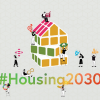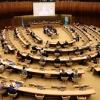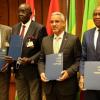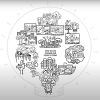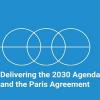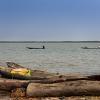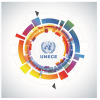Press Releases
Displaying Results 101 - 125 of 133
Approximately 50 million people in the UNECE region live in inadequate housing conditions. In the 21st century, the governance, land and finance systems that influence the delivery and consumption of housing have been beset by numerous crises. Emanating from climate change, unguided investment
Can the oft-shared, yet increasingly scarce and most precious, resource that is water be a source of cooperation, rather than of conflict, among countries? If so, then how? As climate change brings prolonged droughts and more intense floods, how will Governments cope together? More than 20
Ministers from The Gambia, Guinea Bissau, Mauritania and Senegal have agreed to establish a legal and institutional framework for cooperation on the Senegal-Mauritanian Aquifer Basin (SMAB), a shared aquifer basin (groundwater reserve) on which 80% of their populations depend. In a context of
Globally, 690 million people suffer from hunger and three billion cannot afford healthy, nutritious food. Despite this, the Food and Agriculture Organization of the United Nations (FAO) estimates that one-third of all food fit for consumption is either lost during the production or shipping process
The COVID-19 pandemic has had a multi-dimensional effect on the UNECE region, causing the worst economic contraction in decades. Cities and urban areas, with their high population density and interconnectivity, were particularly vulnerable and encountered major disruptions. The pandemic impacted
UNECE today publishes a Set of Core Climate Change-related Indicators and Statistics, along with a set of Implementation Guidelines, both endorsed by the Conference of European Statisticians (CES).
Climate change is an existential threat and poses an immense challenge for humanity. A better
Results of the second Sustainable Development Goal (SDG) report on transboundary water cooperation, published today by UNECE and UNESCO (co-custodian agencies for SDG indicator 6.5.2) on behalf of UN-Water, suggests that not nearly enough operational arrangements for transboundary water cooperation
Nuclear power is a low-carbon energy source that has avoided about 74Gt of CO2 emissions over the past 50 years, nearly two years’ worth of total global energy-related emissions. Only hydropower has played a greater role in avoiding emissions over this period.
Nuclear power currently provides 20
Bold action on energy can deliver climate objectives and sustainable development, according to UNECE
Ahead of the High-Level Dialogue on Energy that the UN Secretary-General is convening in September, UNECE is calling for bold, concrete actions on the 2030 Agenda and the Paris Agreement to move the dials in the near term and to set the stage for longer-term, enduring change.
Action in three
Habtamu Zerihun is a 38-year old father to three daughters, aged 4, 6 and 12 years. Habtamu used to be a construction worker in and around Addis Ababa, until he was hit by a pickup on his walk to work. The pickup driver was under the influence of stimulant drugs and there were no adequate
The United Nations Economic Commission for Europe (UNECE) and the European Investment Bank, the financial investment arm of the European Union, have signed today a Memorandum of Understanding (MoU) to strengthen joint efforts to promote economic cooperation, cohesion and to support countries in the
On 16 June, Guinea-Bissau became the 4th African country (45th party) to accede to the Convention on the Protection and Use of Transboundary Watercourses and International Lakes (Water Convention), whose secretariat is provided by UNECE. It is also a party to the Convention on the Law of the Non-
Countries across the pan-European region and North America are intensifying efforts to make their resource use more circular: to close the loop between raw materials, products and wastes so that materials remain in use and consumption of finite resources is reduced. But the lack of an
Despite decades of discussions on the challenges and intersections between gender and transport, progress has been slow in implementing a gender perspective in transport policies. This has been problematic, for example, in urban planning which fails to recognise the different travel patterns
Human-caused methane emissions are rising, and must be reduced by 40 to 45 per cent by 2030 to limit global temperature rise to 1.5° C, warned the Global Methane Assessment released last month by the Climate and Clean Air Coalition (CCAC) and the United Nations Environment Programme (UNEP). This
Ghana’s transboundary river basins, namely the Volta River basin (shared with Benin, Burkina Faso, Côte d’Ivoire, Mali and Togo – home to over 23 million people, with a population projected to more than double by 2050), Bia and Tano Rivers (shared with Côte d’Ivoire) and Todzie-Aka basin (shared
As one of the most sustainable, inclusive, safe, and healthy forms of mobility, cycling received a major boost today with the adoption of the first-ever Pan-European Master Plan for Cycling Promotion at the Fifth High-Level Meeting on Transport, Health and Environment (THE PEP). The Master Plan is
With a pledge to plant almost 83,000 new trees, Moscow became the first city in Russia to officially commit to the initiative launched by the United Nations Economic Commission for Europe (UNECE) in 2019.
As one of the world’s megacities with a population of over 12 million, Moscow is globally
Since 2018, UNECE has been assisting Montenegro in the implementation of the recommendations from the third Environmental Performance Review (EPR) carried out in 2015.
Since the beginning of the COVID-19 pandemic, activities have been adapted, with funds being redeployed to support the
A UNECE-led partnership will improve energy efficiency of the global building supply chain and its products to deliver high performance buildings in seven UNECE member States: Armenia, Georgia, Kyrgyzstan, Republic of Moldova, Tajikistan, Ukraine, and Uzbekistan.
The launch of the project was
The extraction of raw materials worldwide has more than doubled since 1990 and could double again by 2060, fuelling environmental degradation and increased vulnerability to climate change. As major users and producers of natural resources, 56 countries of the UNECE region, spanning from North
The use of material resources, fuelled by economic and population growth, urbanisation and societal changes, has increased more than ten times since 1900 and is set to double again by 2030. The annual global extraction of materials has increased from 27 to 92 billion tonnes since 1970, while the
Localizing the Sustainable Development Goals at the urban level is crucial to deliver on the 2030 Agenda, stresses UNECE in a new report that advocates for a “cities-based” and “people-smart” approach to sustainable development.
With cities today as the driving force in economic, social,
More robust monitoring and measuring systems are required to meet the Sustainable Development Goals (SDGs), according to a UNECE report on Measuring and Monitoring progress towards SDGs that uses a “nexus” approach to chart a course for more “joined up” activities.
High-quality statistics
Recognizing the vital importance of mobility and connectivity for sustainable economic development and taking stock of key challenges, UNECE has consolidated its work in this cross-cutting area to help countries leverage its tools to steer recovery efforts towards the Sustainable Development Goals


